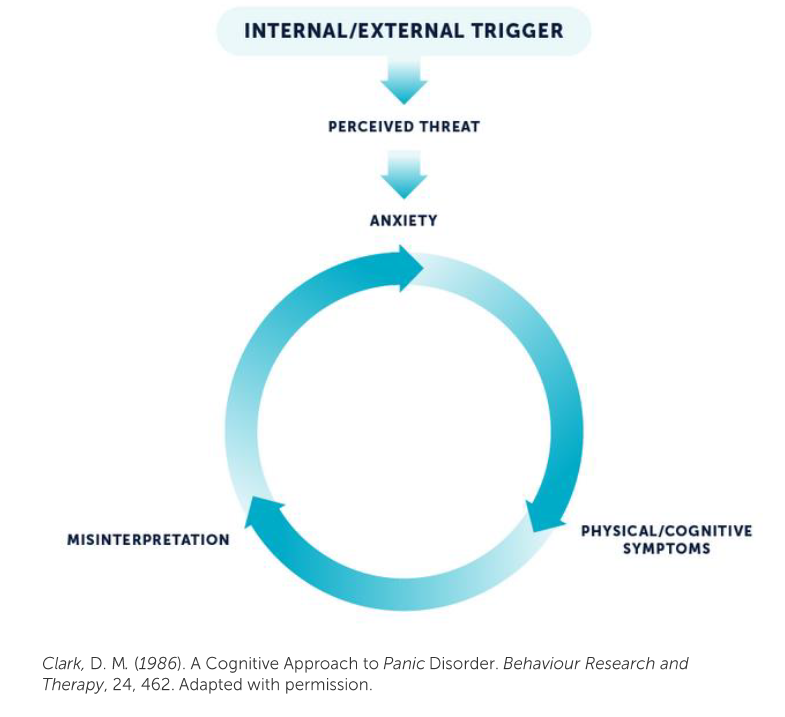Understanding Panic Attacks and Panic Disorder
There’s a good chance that either you or someone you know has had a panic attack. It was probably a scary episode that you hope doesn’t happen again!
It’s important to know that panic is a natural phenomenon built into us to help differentiate impending danger.
Meanwhile, if our thinking leads us to believe that most things in life merit a panicked reaction or a panic attack, we may need to learn to handle these thoughts differently!
First, what is a panic attack?
A panic attack is a sudden urge of intense fear or discomfort that typically peaks within 5 to 20 minutes.
If you notice having at least four of the following symptoms, you may be having a panic attack.
Palpitations, pounding heart, or accelerated heart rate
Sweating
Trembling or shaking
Sensations of shortness of breath or smothering
A feeling of choking
Chest pain or discomfort
Nausea or abdominal distress
Feelings of unreality (derealization) or being detached from oneself (depersonalization)
Fear of losing control or going crazy
Fear of dying
Numbness or tingling sensations (paresthesias)
Chills or hot flushes
Feeling dizzy, unsteady, lightheaded, or faint
There’s more to it than the physiological feelings above, though. Have you ever felt hot or had a fast heart beat? The answer is obviously yes! You may have been exercising, maybe even laughing, or chasing a toddler. These symptoms alone do not always merit a panic attack.
In order for this cycle to be identifiable, there must be a catastrophic misinterpretation. Catastrophic misinterpretation means you feel there is a threat that leads to terrible consequences.
This picture below helps visualize what can happen if we misplace or misinterpret certain triggers.
I had a panic attack—do I have panic disorder?
Having one panic attack does not mean that you’re prone to having them continually. In other words, one panic attack does not always equal having panic disorder.
For panic disorder to be diagnosed, there are other factors that must be present.
- You must have one or more panic attacks and then have continual concern that you’ll keep having them.
- Your behavior must become maladaptive. That can mean being avoidant or not accepting the adjustment/challenge of something new when you typically would be able to adjust.
- If you are on medication that has a possible side effect of altering your behavior or if you have another psychiatric disorder, then you may not automatically be diagnosed as having panic disorder.
No need to panic about having a panic attack.
If you’ve had a panic attack, it’s easy to feel fear about having another one, or maybe you fear you’ll be embarrassed because of the timing of it. Perhaps you’re worried that you’ll be at a social event, taking a test, or at work.
Oftentimes, where you focus may be where you’ll feel the most panic.
If you notice that your heart is racing, you may fear that you’re having a heart attack. If your focus is on being dizzy, you may fear that you’ll faint. Once we’re in panic mode, we don’t think about a racing heart being a familiar, harmless symptom similar to exercising or even laughing hard.
Consider the following scenario:
You find out that your professor is sending emails to students about an exam you recently took. Although many students failed, everyone that attended the study session, just as you did, passed the exam. Regardless of this fact, you begin to worry and your worry begins to snowball.
First, you start to believe you’ll receive an email stating that you failed - even though you attended the study group, recognized the exact questions on the exam and answered them with confidence.
Then, symptoms start to arise such as pressure in your chest, feeling lightheaded, hot and sweaty, muscle tension and a racing heart.
The panic attack then comes because of the physical symptoms that manifested in you, along with the belief (thinking) that you were going to lose control.
Logically you knew that you studied and felt confident with the exam you took, but because you started having physical symptoms, you bypassed the logical thought process (misinterpretation) and had a panic attack. Later you find out that you did pass the exam.
Passing the exam was the logical conclusion that was difficult to draw because of your belief that you failed.
Learning to identify and interpret physical and cognitive symptoms first can lessen the likelihood of having a panic attack.
“
Learning to identify and interpret physical and cognitive symptoms first can lessen the likelihood of having a panic attack.
Panic is a natural feeling that is meant to warn you of impending danger, but when paired with a misinterpretation can keep you from living a life of peace.
If panic is keeping you from living a life you love, it may be time to consider talking to a professional and learning to confront your panic with the right tools and processes.
Our office is a safe place where you can talk to a trusted expert and rediscover peace in your life.
Meet the Author & Simplify Counselor
It’s my pleasure to help people struggling with anxiety disorders and depression and help lead people to a place of peace.
Click here to learn more about my approach to helping clients thrive.





